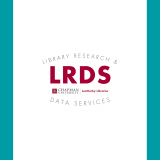My Librarian’s Favorite Resource(s): Philosophy
April 9, 2021
For this week’s “My Librarian’s Favorite Resource(s)” post, we’re going to get super philosophical…about resources for Philosophy students and researchers, that is! This week, Brett Fisher, Chair of the Library Systems & Technology Division, is sharing with us his favorite resources that he uses in his role as Philosophy Subject Liaison Librarian.
Brett writes, “I am the subject liaison for the Department of Philosophy in the Wilkinson College of Arts, Humanities, and Social Sciences. I provide bibliographic instruction and individual research consultations to faculty, staff, and students in support of the Department’s mission to ‘help students to think logically, state and defend views clearly, analyze and solve problems, effectively make moral decisions, and integrate the personal and professional aspects of life.’
I generally recommend using Discover as a good starting point for research because it has a wide scope of subject areas and links to most of our subscription resources.
I would like, however, to shine a spotlight on PhilPapers. Its self-description follows: ‘PhilPapers is a comprehensive index and bibliography of philosophy maintained by the community of philosophers. We monitor all sources of research content in philosophy, including journals, books, open access archives, and personal pages maintained by academics. We also host the largest open access archive in philosophy. Our index currently contains 2,567,811 entries categorized in 5,671 categories. PhilPapers has over 270,000 registered users.’
PhilPapers allows you to search citations and abstracts for academic publications in philosophy. You can also search topics, journals, and the profiles of registered users. Results are ordered by relevance but you can also sort by impact, number of downloads, and other fields. You can sign up for email alerts to receive email notifications when works are added to any page, including search results.
Clicking on an article’s title will show more tools and details including keywords, category labels, and citations and references. Various tools allow you to save a work to a list, export its citation, and edit its information (including the abstract, Internet links, and categories).
Among my favorite features are the categories. PhilPapers has over five thousand categories maintained by volunteer academic editors who are specialists in the relevant topics. In addition to listing works relevant to a topic, many categories contain a summary of the topic and a list of key and introductory works.
Additionally, you’ll find links at the top for PhilArchive (an open access e-print archive in philosophy), PhilPeople (an online community for philosophers), PhilJobs (jobs for philosophers), and PhilEvents (upcoming events in Philosophy). PhilEvents is a great way to start getting involved in the larger community of philosophers and it provides filters to limit to local-only events.
For even more great philosophy resources, see the Philosophy Research and Study Guide.”



